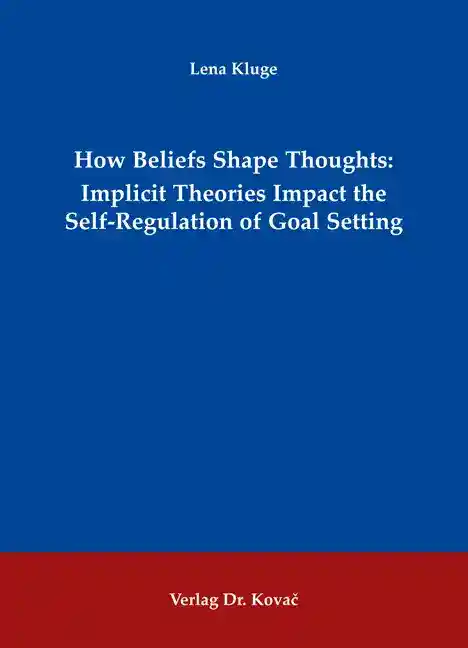Lena KlugeHow Beliefs Shape Thoughts: Implicit Theories Impact the Self-Regulation of Goal Setting
Studienreihe psychologische Forschungsergebnisse, Band 170
Hamburg 2013, 92 Seiten
ISBN 978-3-8300-6830-3 (Print) |ISBN 978-3-339-06830-9 (eBook)
Zum Inhalt
In the present research, we explored whether people’s implicit theories also influence the way people set their goals. Specifically, we suspected that people’s implicit theories affect how they choose to think about their wishes, particularly in the context of fantasy realization theory, which in turn influences their goal setting. Moreover, we investigated whether implicit theories affect the benefits that people gain from using the various self-regulatory modes of thought in the process of goal setting.
People differ in their implicit theories about their abilities (incremental vs. entity theorists). Incremental theorists believe their abilities (e.g., intelligence) are malleable; entity theorists believe their abilities are fixed (Dweck, 2007; Dweck & Leggett, 1988). Based on the fact that people’s implicit theories influence the kind of goals they set for themselves (performance vs. learning goals), we suspected and found that their implicit theories also influence the way in which people set their goals. Oettingen (2000, 2012) defines four self-regulatory modes of thought individuals use in their goal setting process: mental contrasting of the desired future with the present reality, indulging in the desired future, dwelling in the present reality, or reverse contrasting of the present reality with the desired future. When observing which of the four modes of thought participants chose, we saw that, relative to entity theorists, incremental theorists chose more modes of thought that were anchored in the desired future (i.e., mental contrasting and indulging) and fewer modes of thought that were anchored in the present reality (i.e., dwelling and reverse contrasting; Studies 1, 2). Furthermore, only participants who held an incremental theory showed the typical benefits of mental contrasting as effective tool to transform wishes into binding goals, entity theorists did not (Study 3). The results suggest that implicit theories guide the choice of modes of thought and impact the benefit of induced mental contrasting on goal commitment.
Schlagworte
Carol DweckGabriele OettingenImplizite TheorienMentales KontrastierenMotivationMotivationspsychologiePsychologieSelbstregulationsstrategienZielsetzenIhr Werk im Verlag Dr. Kovač

Möchten Sie Ihre wissenschaftliche Arbeit publizieren? Erfahren Sie mehr über unsere günstigen Konditionen und unseren Service für Autorinnen und Autoren.
